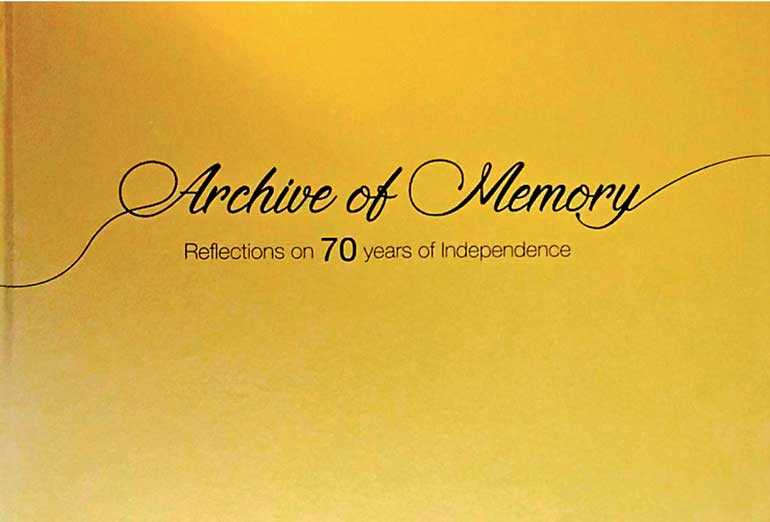Wednesday Feb 18, 2026
Wednesday Feb 18, 2026
Saturday, 5 December 2020 00:00 - - {{hitsCtrl.values.hits}}

By Ruwani de Silva
Everyday people around the world touch, feel, and look at objects, perhaps without giving much thought to the memories and stories these objects may hold. We are indeed however, surrounded by objects that hold history, love, heartbreak, unfairness, and life itself.
‘The Archive of Memory: Reflections on 70 years of Independence’ is a recently published book that explores this very theme, edited and curated by Malathi de Alwis and Hasini Haputhanthri and photography by Sharni Jayawardena. The book offers its readers a personalised perspective into the past 20 years, taking them on an emotional journey through Sri Lanka.
Covering stories from all districts of the country and several from overseas, most of stories are around the time period of the 1980s and 2000s. The best description of this prolific piece of work comes from the curators themselves, describing the motivation behind the works as such: “Sri Lankan history, politics, and culture particularly from a people’s perspective, we believe, is crucial to nurturing tolerance, sympathy, and empathy within our fissured and fractured society today.”
The book has 70 stories – one story for each year of Sri Lanka’s Independence – in order to reflect upon the 70 years that have passed since 1948. Each story is accompanied by an additional page with black and white photographs, bringing the main element of each story to life in a visceral pictorial depiction.
As only Jayawardena can – each picture is more than an object, it is the soul of the story being told and the preservation of memory in the visual. The collection included narrations from family members, friends, and acquaintances of the Curators, as well as those who heard about the project and wanted to pen their story.
The book takes you through personal stories from all around the country using images of objects that are dear to the narrator. The diaphanous saree, the smell of jasmine flowers, a coconut shell and its place in the house gains new meaning as the reader walks in the shoes of seventy people telling their stories of living through communal riots, youth insurrections, natural disasters, and the civil war.
As storytellers recollect events that happened behind doors as they wait for the anti-Tamil riots to pass the Sri Lankan Military to bring back the piano, what stands out as a glimmer of hope is the constant reminder of how humanity creeps in through the cracks, even in the most hopeless of times.
As de Alwis and Haputhanthri explain, “The stories are analogues to living memory, storing information beyond individuals’ experiences. ‘Entering us through the senses,’ they become history, like the fragments that speak to the palaeontologist or geologist” and is it for us to remember them, cherish them and pass them on so that these key experiences of the storytellers will live for generations to come.
This book will leave you with a bittersweet feeling of having had a glimpse into the lives of beautiful, courageous and resilient individuals whose experiences have shaped the annals of history. In reading this one hopes that those who delve into this book – particularly those who have not lived through some of the times spoken about – will look at objects such as the ‘Pan Thaliya’ and know of the caste barriers that were a part of the society. Perhaps another will look at a food plate at their homes and reflect upon Rajeswary’s story of her son. The book has the potential to inspire each reader to speak, write and document their own truth using objects that we treasure, and see our stories as catalysts to moving into a better future.
The book can be purchased via the Historical Dialog website as well as the Perera-Hussein Publishing House website, and is currently available in Sinhala and English.
[Ruwani de Silva is a Communications Intern with Everystory Sri Lanka. Everystory Sri Lanka identifies as a storytelling collective of young feminists based in Sri Lanka. They work towards creating spaces in Sri Lanka where alternative narratives of those underrepresented, historically marginalised and/or oppressed, and not seen in the mainstream spaces of Sri Lanka and South Asia, can find a voice. You can follow them on Facebook (Everystory Sri Lanka) and Instagram (@everystory.sl) to learn more about their work.]